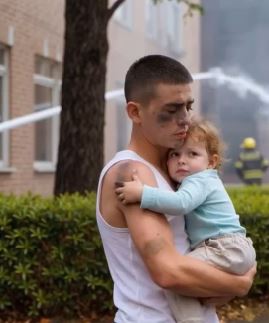
It began as one of those perfect small-town afternoons in Willow Creek — the kind that hums with laughter and the scent of grilled food drifting through the air. Children chased each other through piles of golden leaves while neighbors swapped stories over lemonade. Then, in an instant, the calm fractured. Thick smoke rose from behind a nearby house, followed by a scream that silenced the entire street. A shed was burning — and a toddler was trapped inside. Before anyone could move, my 12-year-old son, Rory, dropped his phone and sprinted straight toward the flames.
It began as one of those perfect small-town afternoons in Willow Creek — the kind that hums with laughter and the scent of grilled food drifting through the air. Children chased each other through piles of golden leaves while neighbors swapped stories over lemonade. Then, in an instant, the calm fractured. Thick smoke rose from behind a nearby house, followed by a scream that silenced the entire street. A shed was burning — and a toddler was trapped inside. Before anyone could move, my 12-year-old son, Rory, dropped his phone and sprinted straight toward the flames.
The world seemed to stop. I shouted for him to come back, but he was already gone, swallowed by smoke and heat. Every second stretched unbearably until, through the haze, he reappeared — face streaked with soot, coughing, clutching the sobbing toddler in his arms. Neighbors rushed to help, firefighters arrived, and by nightfall, Rory was being called a hero. Cameras came, stories spread, and for a moment, it felt like the world had witnessed something pure and brave. But the real story was still waiting to unfold. The next morning, a cream-colored envelope appeared on our doorstep with a handwritten message: “Bring your son to the red limousine near Maple Grove Middle School at 5 a.m. — K.W.”
At dawn, curiosity led us there. The red limousine idled quietly by the curb, and inside sat a man in his sixties — tall, gentle, with a firefighter’s coat folded beside him. His name was Kenneth Wallace, a retired firefighter who had lost his daughter in a house fire years earlier. With quiet emotion, he told Rory that hearing about his bravery had rekindled something he thought he’d lost — hope. He handed Rory an envelope containing a certificate from a foundation he’d created in his daughter’s honor: a scholarship for courage, not for grades. “Real heroes,” he said softly, “don’t act for praise. They act because they can’t look away.”
https://syndicatedsearch.goog/afs/ads?sjk=6VSQH6z0RRm%2BYLD%2BRJ1W7g%3D%3D&psid=5134551505&channel=AutoRsVariant&cx=r-
That meeting changed everything. Rory began studying fire safety, first aid, and community rescue work, determined to honor both Wallace’s daughter and the lesson he’d been given. The firefighter’s badge Wallace later gifted him now sits proudly on Rory’s desk — a reminder that courage isn’t about age or strength, but compassion in motion. For Wallace, meeting Rory brought a measure of peace; for us, it revealed something timeless. One act of bravery can echo far beyond its moment — turning fear into purpose and reminding us that goodness, once sparked, can light the world anew.